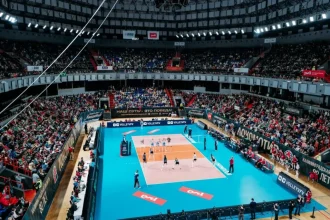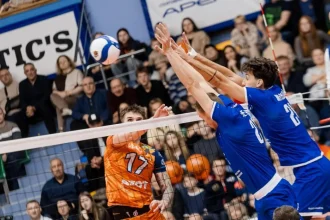Before stepping on court at Arthur Ashe Stadium, Alexander Bublik offered a prophetic take on his opponent: “He’s like an AI-generated player,” he said of Jannik Sinner in a pre-match interview with ESPN. It turned out to be less hyperbole and more foresight.
Over the course of just 81 minutes, the top-seeded Sinner delivered a performance that seemed engineered—an extraordinary blend of power, precision, and composure that left Bublik and the crowd stunned.
The match began with high expectations. Bublik arrived in form, having held serve 55 consecutive times and riding an 11-match win streak that included two titles since Wimbledon. He had also defeated Sinner in their most recent encounter back in June. Just two nights earlier, he had dispatched No. 14 seed Tommy Paul on the same court.
But all of that momentum vanished almost immediately. Sinner broke Bublik in the opening game—a rare feat given the Kazakh’s serving prowess. Despite landing six first serves, Bublik couldn’t keep Sinner from getting the ball back in play, and a double fault on break point set the tone.
From there, the match unraveled quickly for Bublik. Down 0-4 in the first set, he flubbed a drop shot into the net. Trailing 1-5, he resorted to two underhand serves—one of which resulted in a double fault. At set point, he attempted another casual drop shot, which Sinner easily dispatched for a winner.
The second and third sets followed the same script. Each began with a Sinner break, and Bublik—clearly struggling for belief or rhythm—never recovered. Sinner’s footwork and shot selection were near-perfect. He faced just one break point all night and won 81% of his first-serve points.
“I broke him very early in every set, which gave me the confidence to serve a little better,” Sinner said afterward. He also praised the electric night-session atmosphere: “So much energy here.”
While Sinner rose to the occasion in his Ashe night debut, Bublik’s game flatlined. Known for his serving, he managed just two aces and a costly 13 double faults. He won only 19% of his second-serve points and produced just 13 winners against 31 unforced errors.
Bublik did manage to draw a few cheers with some reflex return winners late in the match, but the crowd’s brief bursts of hope only underscored how lopsided the contest had become. Sinner closed it out with clinical ease: 6-1, 6-1, 6-1.
At the net, Bublik smiled and summed it up to Sinner with a mix of humor and disbelief: “I’m not bad. But what the f—?”














